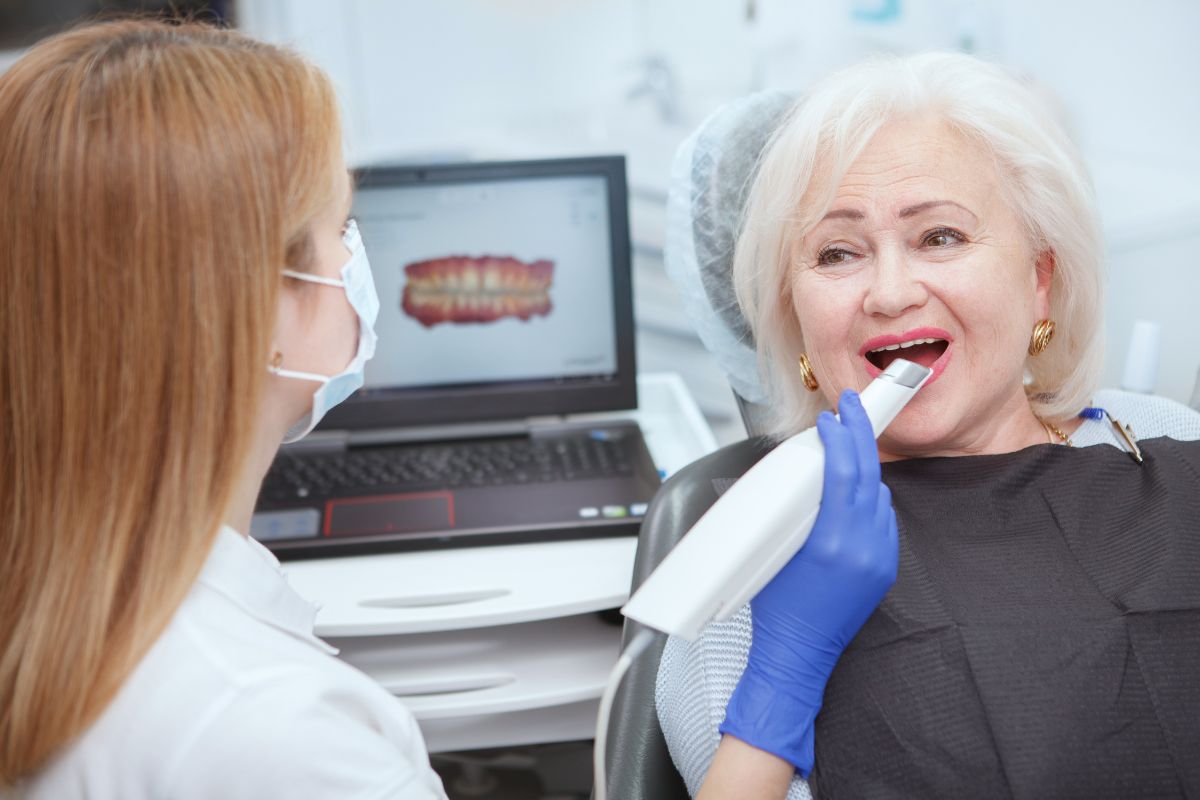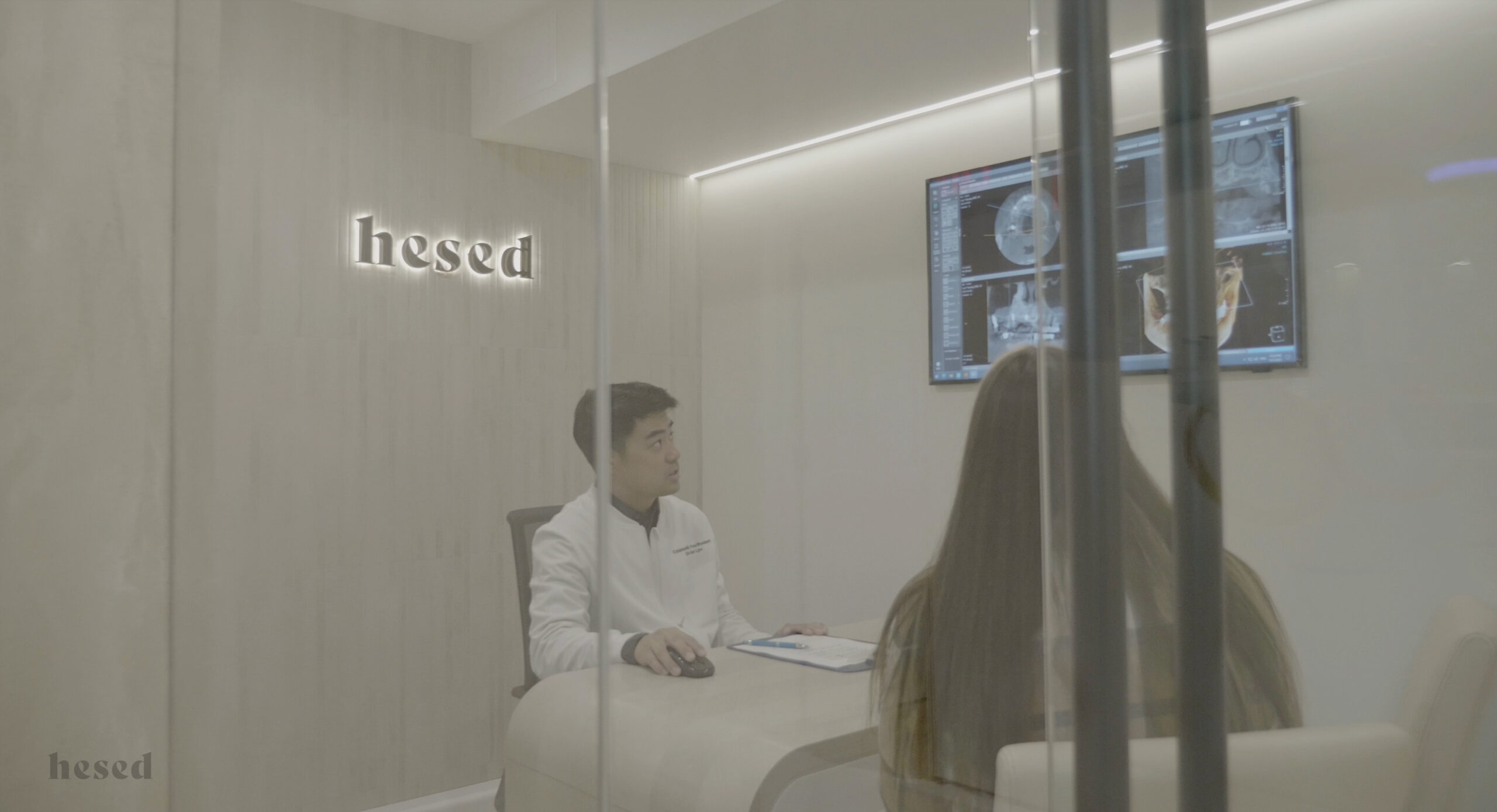Maintaining a healthy and effective smile can be difficult as we age. Did you know one-quarter of adults aged 65 or older have only 8 or fewer teeth? Tooth loss, gum disease, and decreased bone density are typical problems among seniors that reduce their quality of life. Is there a way to restore a full, confident smile at this golden age?
Yes, full mouth dental implants for seniors can provide state-of-the-art solutions to this problem. But can seniors get dental implants without complications? This needs to be discovered. So let’s clear all your worries regarding full mouth dental implants for seniors in this blog and find the best solution to improve your smile.

Full mouth dental implants, or full-arch implants, are a permanent solution for older people who have lost most or all of their teeth. Dental implants are titanium posts surgically inserted into the alveolar bone, in contrast to conventional dentures supported by the gums. These posts provide a sturdy foundation for an entire set of replacement teeth by acting as prosthetic teeth.
Full mouth dental implants are a more effective and advanced solution if you are in your golden years and tired of dealing with removable dentures daily. The perk of full mouth dental implants for seniors is that they have a natural appearance and feel, function similarly to natural teeth, and are long-lasting with the proper care.
They are the most dependable and durable tooth replacement option for old age.
Yes, don’t get worried reading about these complications as most of them are rare and full mouth dental implants for seniors have a high survival rate. Full mouth dental implants for seniors have various perks making them a popular choice among older folks. They are more stable and comfortable than dentures because implants are securely inserted into the jawbone, preventing slippage.
One significant advantage is that full mouth dental implants for seniors preserve facial symmetry and prevent a sunken look. Also, they appear and act like natural teeth; with appropriate care, implants can last a lifetime.
You may wonder, “Should a 70 year old get dental implants?” The answer is YES, as long as you are healthy. Age is not a limiting factor for dental implants. The essential parameters are gum health and alveolar bone density. Many seniors in their seventies, eighties, and even nineties have had a successful implant procedure.
Long-term research tracked 902 dental implants implanted in 346 individuals aged 56 to 89 for 2 to 17 years. The findings were impressive. Implant survival rates were 95.39% in implant-based analysis and 99.98% in patient-based analysis, with only 29 implant failures documented. Moreover, radiographs revealed an average bone loss of 0.17 ± 0.71 mm, indicating the implant’s overall health.
Age should not be a barrier to contemplating this life-changing alternative if you have no uncontrolled health problems like diabetes or cardiovascular problems and sufficient bone to sustain implants.
The good news is that full mouth dental implants for seniors can still be used despite bone loss. With technological breakthroughs, dental bone grafting can help restore the alveolar bone density, allowing it to sustain implants.
In certain situations, seniors with low bone density can benefit from mini implants or specialized procedures. Although full mouth dental implants for seniors have a good survival rate, if you are considering Full mouth dental implants in NJ, it is wise to consult a professional, experienced, and best dentist in NJ to avoid any complications.
Although dental implants are durable treatment alternatives for regaining oral function and attractiveness in older individuals, they come with certain risks and complications, especially for seniors. It is critical to consider the following factors when determining the suitability of implants.
One of the most common and major issues seniors confront is diminishing alveolar bone density, which is required to sustain implants. Bone resorption increases with age making it harder for implants to integrate effectively.
As we age, our body’s ability to heal reduces, which negatively impacts the healing process following implant insertion. Older people can experience prolonged healing times, which can increase the risk of infections or implant failure. It is also critical to address any pre-existing medical condition that can impede recovery, such as diabetes, osteoporosis, or any autoimmune disease.
Like any other surgical procedure, dental implants present a risk of infection. This risk increases as we age. Seniors with impaired immune systems or other underlying health issues may be more likely to suffer implant-site infections. Maintaining proper dental hygiene and following post-operative care recommendations are essential for lowering the risk.
In rare situations, improper implantation can result in nerve injury, resulting in numbness, tingling, or pain in the lingual area, gums, or chin. Elderly with altered anatomy from decreased bone density or past dental procedures are more at risk. Before performing surgery, the dentist must thoroughly assess the patient’s anatomy to prevent these issues.
Although the survival rate of implants in seniors is high, implant failure is still possible. Implant failure can be caused by several reasons like smoking, poor bone density, and uncontrolled medical conditions like diabetes. An additional try or removal can be necessary if the implant loosens or falls out due to improper integration with the jawbone.
Implants in the upper jaw carry a risk of problems related to the sinuses. If the implants protrude into the maxillary sinus, infections or sinusitis can result. An increased risk of this complication is seen in elderly persons with low upper jaw bone density.
Many seniors take multiple medicines, which can interfere with implant success. Certain osteoporosis drugs like bisphosphonates have been shown to impact bone healing and may increase the chance of implant failure. Blood thinners like aspirin, apixaban, heparin etc, which are often prescribed to elderly people, can increase the risk of severe bleeding during implant insertion.

Full mouth dental implants offer perfect solutions for seniors looking to restore a youthful smile and improve their dental health. Age is not a barrier, and even those with low bone density can benefit from advanced dental technology.
If you seek full mouth dental implants for seniors in NJ, choose Hesed Dental Clinic for expert guidance and a professional team. Don’t risk your smile in the hands of an inexperienced dentist. Trust the best dentist in NJ because you deserve a brighter and healthier smile.
Do you have a toothache or think you may need a root canal? Call or find us online for a convenient appointment at Hesed Dental Clinic. Our skilled, professional staff is ready to gently and efficiently treat your dental issues. We are located at 543 Gorge Road, Cliffside Park, NJ 07010. We look forward to helping you restore optimal dental health and a natural, beautiful, pain-free smile.

Hesed Dental 543 Gorge Road Cliffside Park, NJ 07010
201 941 8877